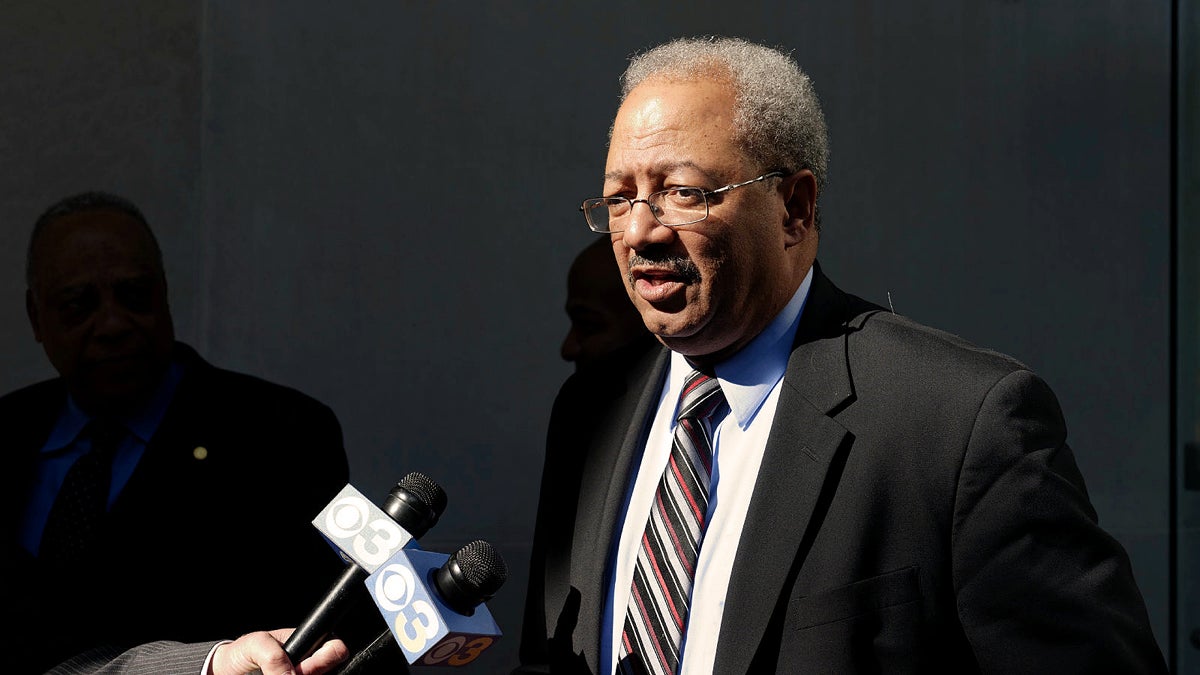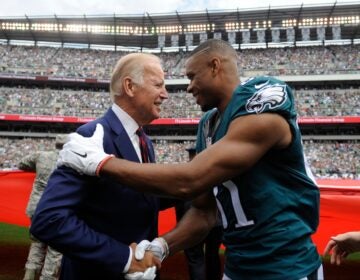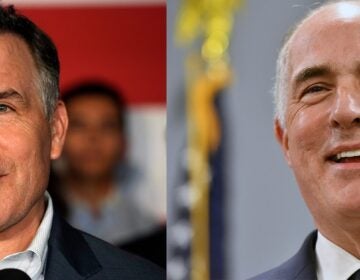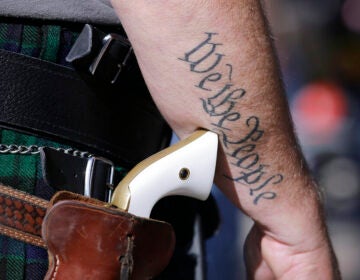Fattah lawyer grills former ally over $1 million illegal loan, repayment
Listen
U.S. Rep. Chaka Fattah answers questions at the U.S. Courthouse in Philadelphia. (Bastiaan Slabbers for NewsWorks)
Through spirited and, at times, adversarial exchanges, lawyers representing indicted U.S. Rep. Chaka Fattah and his co-defendants tried Thursday to discredit and undermine one of the government’s key witnesses during the fourth day of Fattah’s federal corruption trial.
Fattah hired high-profile political consultant Thomas Lindenfeld to help with his failed run for Philadelphia mayor in 2007, the year that ultimately sent Michael Nutter to City Hall.
Over the course of two days, Lindenfeld has testified that Fattah knew about an illegal $1 million loan made to help his flailing campaign late in the election season, as well as a scheme to repay $600,000 of the loan with the help of what Lindenfeld called a “fig leaf” marketing contract with one of Fattah’s longtime friends and co-defendants, Robert Brand.
On Thursday, during a full day of testimony, Lindenfeld said Fattah introduced the idea of creating a sham environmental nonprofit so that Lindenfeld’s political consulting firm could receive federal grant money.
Fattah was unable to pay off an outstanding debt owed to Lindenfeld for his work on the mayoral campaign and saw this as a solution, he said.
In 2014, Lindenfeld, 61, pleaded guilty in connection to this case with hopes that his testimony at trial would land him a more lenient sentence.
During cross examination, Samuel Silver, one of Fattah’s lawyers, zeroed in on that fact before picking through Lindenfeld’s narrative about the $1 million loan, which far exceeded the city’s newly minted campaign-finance limits.
Silver ticked off the number of times Lindenfeld met with prosecutors before the trial (more than a handful) and stressed that Lindenfeld had been less than candid about his illegal activities with his family, friends and colleagues.
Silver also went after Lindenfeld’s profession — all seemingly to paint the Ivy League-educated campaign consultant as untrustworthy and opportunistic.
“Would you say winning is pretty important in your business,” asked Silver.
“I could say the same about yours,” said Lindenfeld, who calmly skirted questions throughout Thursday’s testimony.
When asked by another lawyer whether he had lied to investigators about his crimes, Lindenfeld said, yes, “to avoid telling the truth.”
No paper trail
Things were more serious as Silver questioned Lindenfeld about Fattah’s ties to the $1 million loan that former Sallie Mae CEO Al Lord wired to LSG Strategies, Lindenfeld’s political consulting firm, with the goal of supporting Fattah’s cash-strapped campaign.
The government alleges that Fattah orchestrated the theft of charitable donations and federal grant money to repay the $600,000 the campaign used, and then channeled it through a nonprofit he founded and a for-profit to which he has ties.
Silver said Fattah’s name or signature doesn’t appear on the fake promissory note executed by Lord and Lindenfeld, and so, despite Lindenfeld’s testimony, there’s nothing connecting Fattah to the illegal $1 million loan.
Over and over, Silver asked Lindenfeld if there were any documents supporting Fattah’s knowledge of the loan and its repayment.
Over and over, Lindenfeld said there weren’t.
“We spoke verbally. We didn’t speak that way,” he told Silver.
Prosecutors said Fattah’s name was kept out of the scheme on purpose so that he was removed from the illegal activity.
Lindenfeld spent the early part of Thursday detailing the second of five alleged schemes in which Fattah and two of his four co-defendants allegedly participated.
After the election, Fattah still owed Lindenfeld more than $100,000 for work he did during the mayoral campaign. Lindenfeld said only a couple “small” payments were put toward that debt.
The problem: Fattah didn’t have the cash to pay Lindenfeld. But, as with the $1 million loan, Lindenfeld said Fattah told him he had a fix in mind.
Nonprofit ‘that broke the camel’s back’
At Fattah’s suggestion, Lindenfeld said he created a fake nonprofit called the Blue Guardians, an “environmental education and coastal heritage organization” aimed at protecting the Atlantic and Gulf Coasts, as well as the Caribbean.
Fattah, who sat on the House Appropriations Committee, could then steer federal grants to the organization. They wouldn’t be used to settle Fattah’s campaign debt, said Lindenfeld, but the new business opportunity was seen as a way to make things right.
Lindenfeld said he made efforts to make the nonprofit appear legitimate, but that it never did anything.
He opened a bank account, got a tax ID, and had an email address created, among other things.
Blue Horizons applied for federal appropriations twice, with Fattah helping to craf some of the application language, said Lindenfeld. The funding caught the attention of a reporter, who called Lindenfeld wanting to know more. The organization folded soon afterwards.
“This was the straw that broke the camel’s back,” said Lindenfeld.
Fattah is charged with racketeering, bribery, bank fraud and other offenses for allegedly misusing hundreds of thousands of taxpayer dollars and charitable donations.
He maintains his innocence, called the charges against him “frivolous” and has predicted complete exoneration.
WHYY is your source for fact-based, in-depth journalism and information. As a nonprofit organization, we rely on financial support from readers like you. Please give today.





